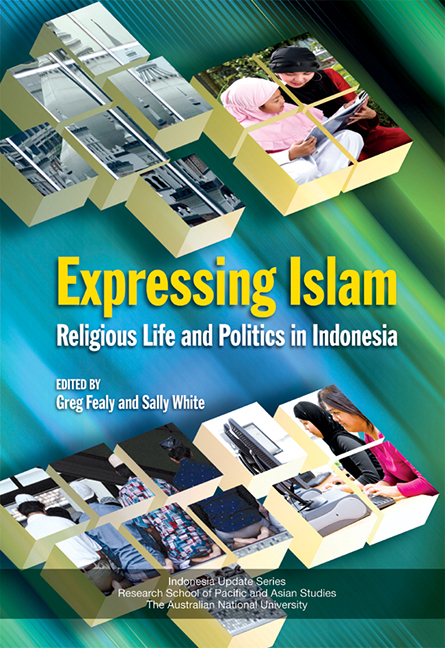Book contents
- Frontmatter
- Contents
- List of Figures and Tables
- List of Contributors
- Acknowledgments
- Glossary
- Map
- 1 Introduction
- PART I EXPRESSING PERSONAL PIETY
- PART II POLITICAL, SOCIAL AND LEGAL EXPRESSIONS OF ISLAM
- PART III THE ISLAMIC ECONOMY
- 13 The Development of Islamic Banking in the Post-crisis Indonesian Economy
- 14 Islamic Microfinance Initiatives to Enhance Small and Medium-sized Enterprises
- 15 Community Development through Islamic Microfinance: Serving the Financial Needs of the Poor in a Viable Way
- Index
- Indonesia Update Series
- Plate section
13 - The Development of Islamic Banking in the Post-crisis Indonesian Economy
from PART III - THE ISLAMIC ECONOMY
Published online by Cambridge University Press: 21 October 2015
- Frontmatter
- Contents
- List of Figures and Tables
- List of Contributors
- Acknowledgments
- Glossary
- Map
- 1 Introduction
- PART I EXPRESSING PERSONAL PIETY
- PART II POLITICAL, SOCIAL AND LEGAL EXPRESSIONS OF ISLAM
- PART III THE ISLAMIC ECONOMY
- 13 The Development of Islamic Banking in the Post-crisis Indonesian Economy
- 14 Islamic Microfinance Initiatives to Enhance Small and Medium-sized Enterprises
- 15 Community Development through Islamic Microfinance: Serving the Financial Needs of the Poor in a Viable Way
- Index
- Indonesia Update Series
- Plate section
Summary
Before the economic crisis of 1997–98, Bank Muamalat Indonesia was Indonesia's only Islamic commercial bank. It was founded in 1991 to meet demand from educated middle-class Muslims for Islamic banking services, and as part of then president Soeharto's political strategy to accommodate Muslim aspirations. The bank began trading in May 1992. Since the crisis, two additional Islamic commercial banks have been established, as well as a large number of Islamic banking units operated by conventional banks.
The 1998 Banking Law has facilitated the development of a dual Islamic and conventional banking system by allowing state, private and regional banks, as well as one foreign bank, to provide Islamic banking services. The law defines an Islamic bank as a commercial bank that complies with Islamic law (sharia) prohibitions against payment of interest (riba), contractual ambiguity (gharar), financial speculation (qimar) and other prohibited (haram) activities. In this chapter, the terms ‘Islamic bank’ and ‘sharia bank’ are used interchangeably.
This chapter argues that Islamic banking in Indonesia has the potential to grow greatly in volume if the banks can improve their product development and risk management procedures, and if they can raise the general level of awareness among the population about Islamic banking. Attention should also be paid to improving the effectiveness of regulation and correcting the distortionary tax arrangements whereby sharia products are subject to excessive levels of value-added tax.
THE PROGRESS OF ISLAMIC BANKING
The fast growth of Islamic banks in the post-crisis era has been driven by the belief that there is untapped demand within the community for Islamic banking services, especially among Indonesia's increasingly affluent Muslim middle class. Encouraged by the success of the international Islamic banking sector, many conventional banks (including one foreign bank) have opened Islamic banking units. In addition, Indonesia has three Islamic commercial banks: Bank Muamalat Indonesia, Bank Syariah Mandiri and Bank Syariah Mega Indonesia. Unlike the Islamic banking units, which are organisational units within an existing conventional bank, the Islamic commercial banks are established as separate legal entities.
Whereas Bank Muamalat Indonesia was founded from the start as an Islamic commercial bank, Bank Syariah Mandiri and Bank Syariah Mega Indonesia started out as conventional banks (Bank Susila Bhakti and Bank Umum Tugu respectively) and converted to Islamic banking.
- Type
- Chapter
- Information
- Expressing IslamReligious Life and Politics in Indonesia, pp. 229 - 250Publisher: ISEAS–Yusof Ishak InstitutePrint publication year: 2008



